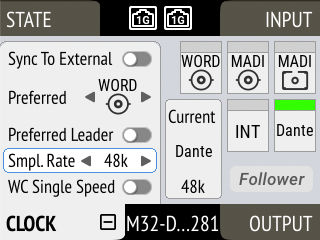Sample Rates Overview
The M-32 AD Pro II-D supports the following sample rates:
Single speed |
44.1 kHz, 48 kHz |
Double speed |
88.2 kHz, 96 kHz |
Quad speed |
176.4 kHz, 192 kHz |
Number of Channels
The supported number of channels per port at different sample rates is shown in the following table.
44.1 kHz |
48 kHz |
88.2 kHz |
96 kHz |
176.4 kHz |
192 kHz |
|
Dante® |
64 |
64 |
32 |
32 |
16 |
16 |
ADAT |
8 |
8 |
4 |
4 |
2 |
2 |
MADI 56 Ch |
56 |
56 |
28 |
28 |
14 |
14 |
MADI 64 Ch |
64 |
64 |
32 |
32 |
16 |
16 |
MADI 56 Ch (96k frame) |
--- |
--- |
28 |
28 |
--- |
--- |
MADI 64 Ch (96k frame) |
--- |
--- |
32 |
32 |
--- |
--- |
| Since there are two independent MADI ports, the total supported number of channels can be multiplied by two. The analog channel count remains identical at all sample rates. |
| The Dante channel count is based on a gigabit ethernet connection. Dante also supports 100 MBit/s switches, however this will limit the above channel count to less than half. It is recommended to only use gigabit ethernet connections. |
Selecting a Sample Rate
-
Enter the CLOCK section.

-
Rotate the encoder to highlight the current sample rate.
-
Push the encoder. Two blue arrows will appear to indicate that the encoder can now be used to change the current setting.
-
Rotate the encoder until the preferred sample rate is shown.
-
Push the encoder again to activate the setting.
Effects of Sample Rate Changes on Existing Routing
The M-32 AD Pro II-D saves one routing table per preset, regardless of sample rate. A change of sample rate or MADI frame mode can reduce the number of input and output channels available for routing. This does not alter the routing table. Any existing routing is hidden until another change of sample rate re-enables the channels.
A routing is created at 96 kHz with 32 channels, sending the MADI coaxial Input 1-32 to optical MADI Output 1-32. If the sample rate is now changed to 176.4 kHz and the 56 Ch frame is activated, only the first 14 channels of MADI coaxial input are routed to the optical output. Switching the sample rate to 44.1 or 48 kHz will reveal the previous routing for 32 channels.